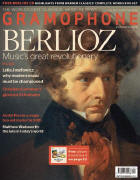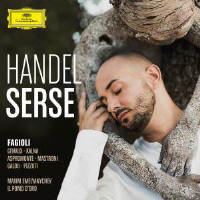Texte paru dans: / Appeared in: |
|
 |
Outil de traduction (Très approximatif) |
|
Reviewer:
Richard Wigmore By all accounts the castrato Caffarelli outdid even his fellow falsettist Senesino in boorish disregard for colleagues and audiences. Lateness and non-appearance in rehearsals and performances were woven into his DNA. Yet when he did deign to appear, all were agreed on his consummate artistry, whether spinning a liquid cantabile or tossing off roulades with a finesse and precision to rival any castrato of the day, Farinelli included. Handel fashioned the title-role in Serse to Caffarelli’s vocal and expressive gifts, above all in the central aria ‘Se bramate’ that alternates vehement coloratura with sudden stabs of anguish. Caffarelli’s range extended easily up to top A, hence the casting of female mezzos in most modern stagings and all previous recordings. Enter the countertenor-cumsoprano Franco Fagioli, whose triumphant performance of the lovelorn, capricious king rightly dominates this new set, recorded at sessions at the Villa San Fermo in Lonigo. It’s speculation, of course. But I’d guess that a voice like Franco Fagioli’s, spanning three octaves, comes as close as we can get today to the mingled brilliance, suppleness and power of the great castrati in their pomp. He immediately displays the rounded sweetness of his tone – more vibrantly feminine than others of his ilk – in Serse’s ‘Ombrai mai fù’, where his superb breath control enables him to phrase in broad, seamless spans. Later in an opera that veers unpredictably between comedy and near-tragedy, Fagioli catches all of the preening monarch’s absurdity and dangerous wilfulness without compromising vocal quality. ‘Se bramate’ is a properly thrilling tour de force, spurred on by the combustible strings of Il Pomo d’Oro, whose eagerly responsive, highoctane playing u performance. Then, when Serse finally throws his toys out of the pram and invokes the Furies, Fagioli deploys the full extent of his freakish vocal range, down to a resonant baritone, in a spectacularly over-the-top performance. Just occasionally – say in the juddering added trills in the da capo of ‘Più che penso’ – you might question Fagioli’s taste in ornamentation. And his rich tone is not always conducive to verbal clarity. But few if any falsettists today could match his combination of temperament and vocal glamour in this notoriously taxing part. While Fagioli will be the prime draw for many, the rest of the cast easily hold their own in vocal lustre and dramatic immediacy. As in the 1738 London premiere, the role of Serse’s more amenable brother Arsamene is taken by a mezzo-soprano. With her flaming intensity of voice and manner, Vivica Genaux makes him more positive than usual, avoiding the trap of mooning passivity in the slow arias and erupting thrillingly in ‘Sì, la voglio’, where Arsamene finally locates his inner alpha male. The two sisters are aptly contrasted. Inga Kalna, as Romilda, is darkly sensuous in timbre yet with a nice line in teasing playfulness, while Francesca Aspromonte’s blithe, fresh-toned Atalanta is keenly alive to the moments of tenderness, even melancholy, that add depth to the character. This Atalanta is no mere flirt. Aspromonte also gives an object lesson in the pointing and colouring of the Italian text. With her naturally incisive, ‘masculine’ timbre, Delphine Galou cuts a very human figure as Serse’s abandoned betrothed Amastre. She suggests more hurt than anger in the tortuous ‘Anima infida’ and distils an emollient tenderness in a beautifully floated ‘Cagion son io’ – Amastre’s cathartic moment. Both basses, too, are splendid: Biagio Pizzutti balancing slapstick and firm tone as the comic servant Elviro, and Andrea Mastroni, a ripe-voiced basso cantante, impressing in the sturdy, no-nonsense arias Handel wrote for Serse’s dutiful general Ariodate. Both these native Italian singers rival Francesca Aspromonte in their vivid enunciation. The one serious competitor among rival CD versions of Serse is the excellent Chandos recording directed by Christian Curnyn. To over-simplify, Curnyn and his cast, led by Anna Stéphany’s glowing-toned Serse, place a premium on elegance and lightness of touch without neglecting the opera’s serious undertones. Maxim Emelyanychev, Fagioli and co live more urgently – though not necessarily more speedily – in a performance that combines vocal allure with a coruscating theatricality, not least in the quickfire secco dialogues. Whoever said Baroque ‘dry’ recitative was boring? |
|


/logos/accueil_home.gif)
/logos/Savall.gif)
/logos/Recompenses.gif)